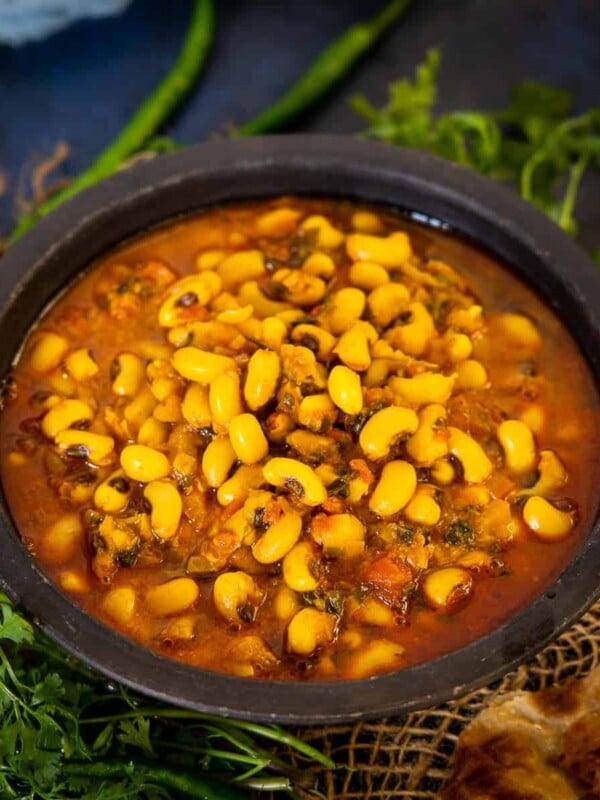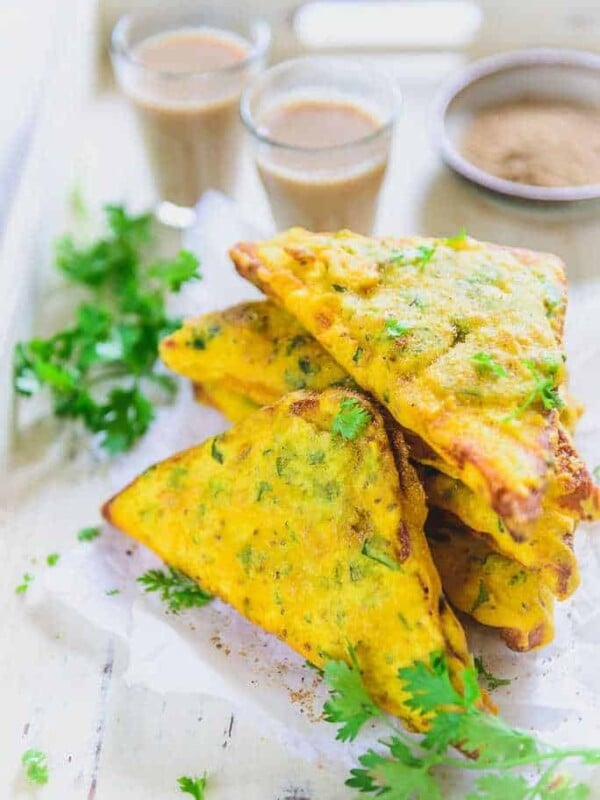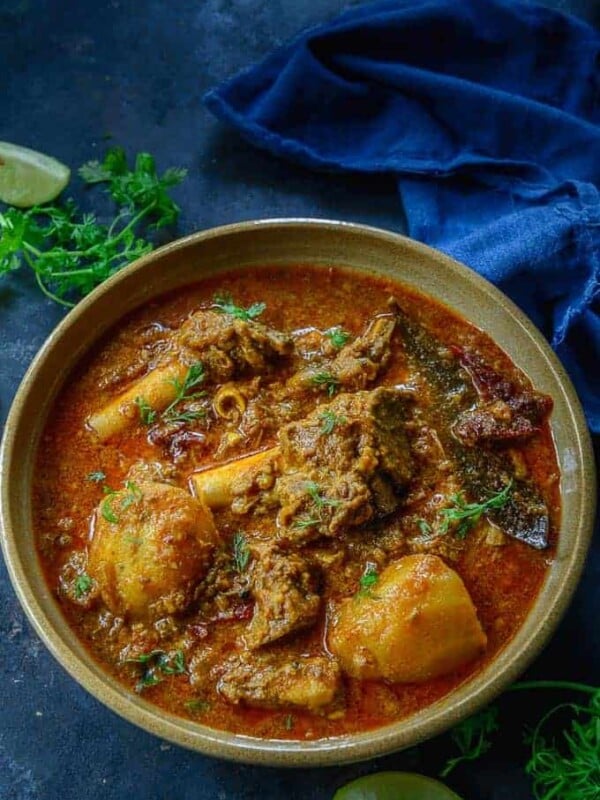Sarson Ka Saag
on Dec 06, 2024, Updated Jun 24, 2025
Make the best Sarson Ka Saag using my foolproof traditional recipe. Serve it with makki ki roti, white butter, and jaggery for a soul-warming meal.
Here are some more green leafy vegetable recipes that you can include in your everyday meals – Palak Paneer, Lauki Chana Dal, Palak Corn Curry, Palak Chole, and Saag Paneer.

Ask any Punjabi about their favorite winter food, and 90% will answer that it’s Makki Di Roti te Sarson Da Saag. With the food going global, this dish has become popular all over India and also abroad.
My mom never made Sarson ka Saag. My first taste of this dish comes from one of the trips to Ludhiana for a Dental conference. It was peak winter, and each and every restaurant had it on their menu.
The food enthusiast in me not only had my share but also coaxed a few chefs to share their secret of making that delicious saag. The conclusion was that although everyone makes it using almost the same ingredients, the trick to make the best-tasting sarson saag is the proportion of the leaves.
Keeping the base recipe that I got from them and multiple trials, I have come up with my own recipe, and if I say so myself, I have never eaten a better tasting saag than mine. Do take my word and try it for yourself.
About Sarson ka Saag
Sarson=Mustard and Saag=Greens. Sarson Ka Saag (spiced mustard greens curry) is a Punjabi specialty made using mustard greens as its main ingredient.
It is made all over northern India in winter when fresh mustard greens (sarson leaves) are in season.
Mustard greens are slightly bitter in taste, so they are cooked with other leafy greens like spinach and bathua saag (chenopodium) to mellow them down. Other ingredients like radish, radish greens, tomatoes, onions, and lots of garlic are also added to elevate the taste of the curry.
Not only is this curry delicious, but it also has many benefits. It’s a rich source of antioxidants, phytonutrients, and vitamins like A, C, K, and E. It’s also a good source of dietary fiber and iron.
Traditionally, the green leaves were cooked for hours over a slow wood fire and churned using a wooden whisk called Mathani while cooking. The process was called ‘Ghotna’.
It took a lot of time to get the saag to the right consistency. But now, with blenders easily available, you can blend the saag much quicker.
While every home has its own way of making this popular Sarson Saag, I have my own favorite recipe. My recipe comes together in under 30 minutes and has an authentic taste to it.
You can cook the leaves in a traditional pressure cooker, an instant pot, or in a pot over the stovetop. I am sharing all the methods in the post below.
This recipe can be easily scaled up or down as per your requirements.
Ingredients
Greens – Traditionally, spinach leaves (palak), bathua leaves (Chenopodium album), radish greens (mooli ke patte), fenugreek leaves (methi), and of course, mustard leaves (sarson ke patte) are used to make sarson ka saag.
While mustard leaves are the main ingredient, you can always skip one or two other greens in this recipe if you can’t find them.
You can also replace some of the greens with collard greens or turnip greens.
The mixed greens bag (spinach, turnip and collard) available at Walmart or Trader Joe’s is also perfect to make this curry.
Tomatoes give a perfect tartness to the saag. Use juicy red tomatoes for this recipe.
Makki Ka Atta (Cornmeal, Maize Flour) is used to thicken the saag and make it creamier.
Others – You will also need fresh ginger, onions, garlic, green chilies, radish (or turnips), red chili powder, asafetida (hing), and salt.
Some people add garam masala powder to their saag, but I personally don’t like it. Feel free to add some if you wish to.
You can always adjust the green chilies and red chili powder to your liking.
Tempering – Temper the saag with a ghee tadka of onions and garlic. You can also add some cumin seeds to the tempering for added flavor.
How To Make Punjabi Sarson Saag
Preparation
Start by preparing the green leaves.
Pluck the leaves from the stem and discard the thick stems.
Measure 200 g mustard leaves (sarson), 35 g spinach (palak), 35 g radish greens (mooli ke patte), 35 g chenopodium (bathua), and 35 g fenugreek leaves (methi).
Note – If you don’t have any of the above-mentioned greens, then just skip adding them.
Wash the leaves thoroughly 2-3 times with water to get rid of any mud in them.
Drain well.
Cook the Greens
In A Pressure Cooker
Add the washed greens to a large pressure cooker. Press the green so that they fit in the cooker.
They will be reduced drastically in volume once cooked.
Since we will be blending the greens in a blender later, you don’t have to chop them.

Add the following ingredients to the cooker.
- 1 cup chopped tomatoes
- 1 cup chopped onions
- 2 tablespoon chopped ginger
- 2 tablespoon chopped garlic
- ¼ cup peeled and chopped radish
- 2 teaspoon chopped green chilies
- 1 teaspoon salt
- 1 cup of water

Close the lid of the cooker and pressure cook for one whistle on high heat.

Remove the pressure cooker from heat and let the pressure release naturally.
Once the pressure is released, open the lid of the cooker. Let the greens cool down slightly.

In An Instant Pot
Follow the recipe until adding water.
Close the lid of the instant pot and set the valve to the sealing position.
Press PRESSURE COOK and set the timer to 2 minutes at high pressure.
Once the timer goes off, let the pressure release naturally for 10 minutes.
Release the remaining pressure manually and open the lid of the pot. Let the greens cool down slightly.
In A Pot Over Stove Top
Bring a large pot of water to a boil over high heat.
Once it comes to a boil, add the ingredients and press them with a ladle to cover with water.
Reduce the heat to low.
Cover the pot with a lid and cook for 5-6 minutes.
Remove the pot from heat and let the greens cool down slightly.
Blend The Greens
Transfer the cooked and cooled greens to the large jar of a blender along with the leftover water.

Blend to make a coarse paste (I like my saag a little coarse. If you like it smooth, blend the greens until smooth).

Make The Saag
Transfer the paste to the same pressure cooker or another pan.

Dissolve 2 tablespoon makki ka atta (cornmeal or maize flour) in ½ cup water and add it to the cooker.

Add 1 teaspoon red chili powder and ¼ teaspoon asafetida and mix well.


Cook for 5-6 minutes on medium heat.
If the saag is thick for your liking, then add some water to it and cook for a minute. If it’s too thin, then cook it for 5-6 minutes until the consistency is right.
Check for salt and add more if required.

Temper The Saag
Heat 2 tablespoon ghee in a small pan over medium heat.

Once the ghee is hot, add ¼ cup finely chopped onions and 5-6 garlic cloves (smashed) and fry till golden brown. Keep stirring while frying.


Pour the tadka over the saag and mix well. Serve hot with makke ki roti, jaggery, and white butter.
Tip – Save some tempering to garnish the saag.

Pro Tips By Neha
The only time-consuming part of this recipe is cleaning the greens. I normally clean them a day before I plan to cook the saag. These days, you also get cleaned and washed greens in some specialty stores. Get them to save some time.
Many people think that mustard greens and tomatoes should not be paired together. According to what I have read, I do not see any harm in this, but if you still think that it’s not a good idea to pair these two ingredients, then skip using tomatoes. Use any other souring agent like lemon juice, etc., to give the saag a slightly sour taste.
This recipe can be easily halved, doubled, or tripled. You can make a big batch and keep using it for up to a week.
Frequently Asked Questions
Pick up the leaves and discard the thick stems of the greens.
Take a large pot and fill it with water. Soak the greens in the water for 2-3 minutes and let the impurities settle down.
Then gently take out the greens and discard the water with the impurities.
Repeat this process at least 3-4 times until you get clean water.
The greens are now ready to be used.
I like to do this step one day in advance. It saves me a lot of time when I am ready to cook the saag.
Add all the ingredients to a slow cooker and slow cook for 3-4 hours on high heat. Then blend and temper the saag.
Spinach and bathua help to balance the bitterness of mustard leaves. You can skip adding them if you like that bitter taste.
Yes, it is absolutely safe to eat sarson ka saag during pregnancy.
In fact, mustard greens have many nutrients and are rich in iron, which helps to keep the hemoglobin level in check.
Variations
You can add cubed and fried paneer pieces to your saag.
You can add any cooked beans like rajma or chole to it to make it more filling.
Add cooked chicken or mutton pieces to your saag to make a non-vegetarian version.
Some people also add turnips to their saag. If you are adding turnip, then do not add radish. Turnips and radishes give a nice spicy kick to the salad and are highly recommended.
Serving Suggestions
Sarson ka saag tastes the best when served with warm makki di roti, jaggery, and white butter. If white butter is not available, yellow butter also goes great with it.
Makki Ki Roti aur Sarson da Saag is a match made in heaven. Although this is the traditional way in which Sarson Saag is paired, you can actually serve it with any Indian bread and it will taste as delicious. You can try Roti, Plain Tawa Paratha, Lachha Paratha, or even Missi Roti. Do not forget to serve some white butter, jaggery, and onion along with it. I also like to serve Mooli Ka Laccha with this meal.
Storage Suggestions
Sarson Saag can be stored in the fridge for about a week in an airtight container.
If you are making it in big quantities, I would suggest you temper only the amount you want to serve.
Also, reheat only the amount you want to serve and add a fresh tadka every time.
Close the container properly after every use.
You can either reheat it in a pan or in the microwave.
If you feel it has become a little dry, add a little water and reheat it properly.
You can also freeze it for up to 2 months. Thaw, reheat, give a fresh tempering and serve.
You Might Also like

Sarson ka Saag Recipe
Ingredients
For The Saag
- 200 grams mustard greens (sarson )
- 35 grams spinach (palak)
- 35 grams radish greens (mooli ke patte) (or turnip greens)
- 35 grams chenopodium (bathua)
- 35 grams fenugreek leaves (methi)
- 1 cup chopped tomatoes
- 1 cup chopped onions
- ¼ cup chopped radish (or turnip)
- 1 inch chopped ginger
- 8-10 cloves chopped garlic
- 2-3 chopped green chilies
- 1 teaspoon red chili powder
- ¼ teaspoon asafetida (hing)
- 1 teaspoon salt (or to taste)
- 2 tablespoons corn meal (makki ka atta)
For Tempering
- 2 tablespoons clarified butter (ghee)
- ¼ cup finely chopped onions
- 3-4 cloves peled and smashed garlic
Instructions
Wash The Greens
- Wash the greens thoroughly 2-3 times with water to get rid of any mud in them.
- Drain well.
Cook The Greens
- Add the washed greens to a large pressure cooker. Press the green so that they fit in the cooker.
- They will be reduced drastically in volume once cooked.
- Since we will be blending the greens in a blender later, you don’t have to chop them.
- Add tomatoes, onions, ginger, garlic, radish, chilies, salt, and 1 cup of water to the cooker.
- Close the lid of the cooker and pressure cook for one whistle on high heat.
- Remove the pressure cooker from heat and let the pressure release naturally.
- Once the pressure is released, open the lid of the cooker. Let the greens cool down slightly.
Blend The Greens
- Transfer the cooked and cooled greens to the large jar of a blender along with the leftover water.
- Blend to make a coarse paste (I like my saag a little coarse. If you like it smooth, blend the greens until smooth.
Make The Saag
- Transfer the paste to the same pressure cooker or another pan.
- Dissolve makki ka atta (maize flour) in ½ cup water and add it to the cooker.
- Add red chili powder and asafetida and mix well.
- Cook for 5-6 minutes on medium heat.
- If the saag is thick for your liking, then add some water to it and cook for a minute. If it’s too thin, then cook it for 5-6 minutes until the consistency is right.
- Check for salt and add more if required.
Temper The Sarson Saag
- Heat ghee in a small pan over medium heat.
- Once the ghee is hot, add onions and garlic and fry till golden brown. Keep stirring while frying.
- Pour the tadka over the saag and mix well. Serve hot with makke ki roti, jaggery, and white butter.
- Tip – Save some tempering to garnish the saag.






















veri nice post
Thanks
Can you please tell the measurements of each greens in terms of cup if possible?
Thank you.☺
Thanx for recipe, looks delicious , traditional punjabi way of making sarson ka saag , my mom makes it like that, thanks for sharing !
Thanks for liking Narinder.
Lovely pics Neha and very nice presentation. Keep up the good work.
Cheers
Shilpi
Thnx Shilpi
Love the
Looks so so delicious and warming!
Thnx Aruna
wow such an flavorful and yummy sarson ka saag 🙂 very tempting !!